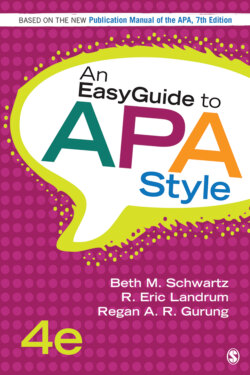Читать книгу An EasyGuide to APA Style - Regan A. R. Gurung - Страница 21
На сайте Литреса книга снята с продажи.
Commonly Confused Words in Psychology and Beyond
ОглавлениеLike other disciplines, psychology has its own terminology and jargon. Your topic-specific textbooks (such as your introductory psychology textbook, cognitive psychology textbook, etc.) introduce you to the specific, technical terms. But even in your own writing about psychology, common words are frequently confused; sometimes this is due to a psychological “spin” placed on those words. Honestly, many of these words are commonly confused in disciplines beyond psychology, so keep this list in mind when writing any paper. Following is a brief listing of commonly confused words, with definitions designed to clear up the confusion (with some assistance from www.dictionary.com).
advice/advise
advice: noun, an opinion given, such as a recommended action
advise: verb, to give counsel, information, or notice
affect/effect
affect: verb, to act on or produce a change in; noun, feeling or emotion
effect: noun, a result or consequence; verb, to bring about
allusion/illusion
allusion: noun, the incidental mentioning or casual referral
illusion: noun, a type of deception or false impression of reality
cite/site/sight
cite: verb, to quote (typically) an authority, to mention as proof
site: noun, the position or location of an item to be located; verb, to put into position or locate
sight: noun, vision, the perception of objects with your eyes; verb, to see or notice or observe
conscience/conscious
conscience: noun, one’s inner sense of right and wrong; ethical, moral principles
conscious: adjective, one’s own awareness of thoughts, sensations, existence
council/counsel
council: noun, an assembly of individuals selected to provide consultation or advice
counsel: noun, advice given to direct the conduct of someone else; verb, to advise or give advice
data/datum
data: noun, plural form, individual facts, statistics, or items of information
datum: noun, singular form of data for one number or a single case
elicit/illicit
elicit: verb, to extract, bring out, or evoke
illicit: adjective, unlawful, not legally permitted or authorized
lay/lie
lay: verb, to place or to put an object at rest, or set down
lie: verb, to be in a horizontal position, recline, to rest, remain, to be situated; to spread a falsehood; noun, a false statement made with intention to deceive, a falsehood
passed/past
passed: verb, past tense, to have moved in a specific direction (e.g., “They passed through Tiffin, Ohio, on their way to Beverly, Massachusetts.”)
past: adjective, gone by in time and no longer exists (e.g., “The flight is now past.”); noun, a time prior to the present moment in time (e.g., “They lived in Green Bay, in the past, before moving to Corvallis.”)
personal/personnel
personal: adjective, pertaining to one individual, private
personnel: noun, the collection of individuals employed in an organization
precede/proceed
precede: verb, to go before, to introduce something preliminary
proceed: verb, to move or go forward, to carry on or continue an action; noun, the total amount derived from a sale or transaction
principal/principle
principal: adjective, highest rank of importance or value; noun, a chief or head or director
principle: noun, fundamental or general law or truth from which other truths are derived
respectfully/respectively
respectfully: adverb, showing politeness or deference
respectively: adverb, in the precise order given, sequentially
then/than
then: adverb, at that time, next in order of time, in that case; noun, that time; adjective, existing or acting (e.g., “the then president”)
than: conjunction, used to show unequal comparison (e.g., “colder than yesterday”), used to show difference or diversity; preposition, to connect two nouns (e.g., “this is better than that”)
who/whom
who: pronoun, which person or people; start of a clause to provide information about a person or people (e.g., “who is the captain?”)
whom: pronoun, the object of a verb or preposition (e.g., “whom did she see?”)
